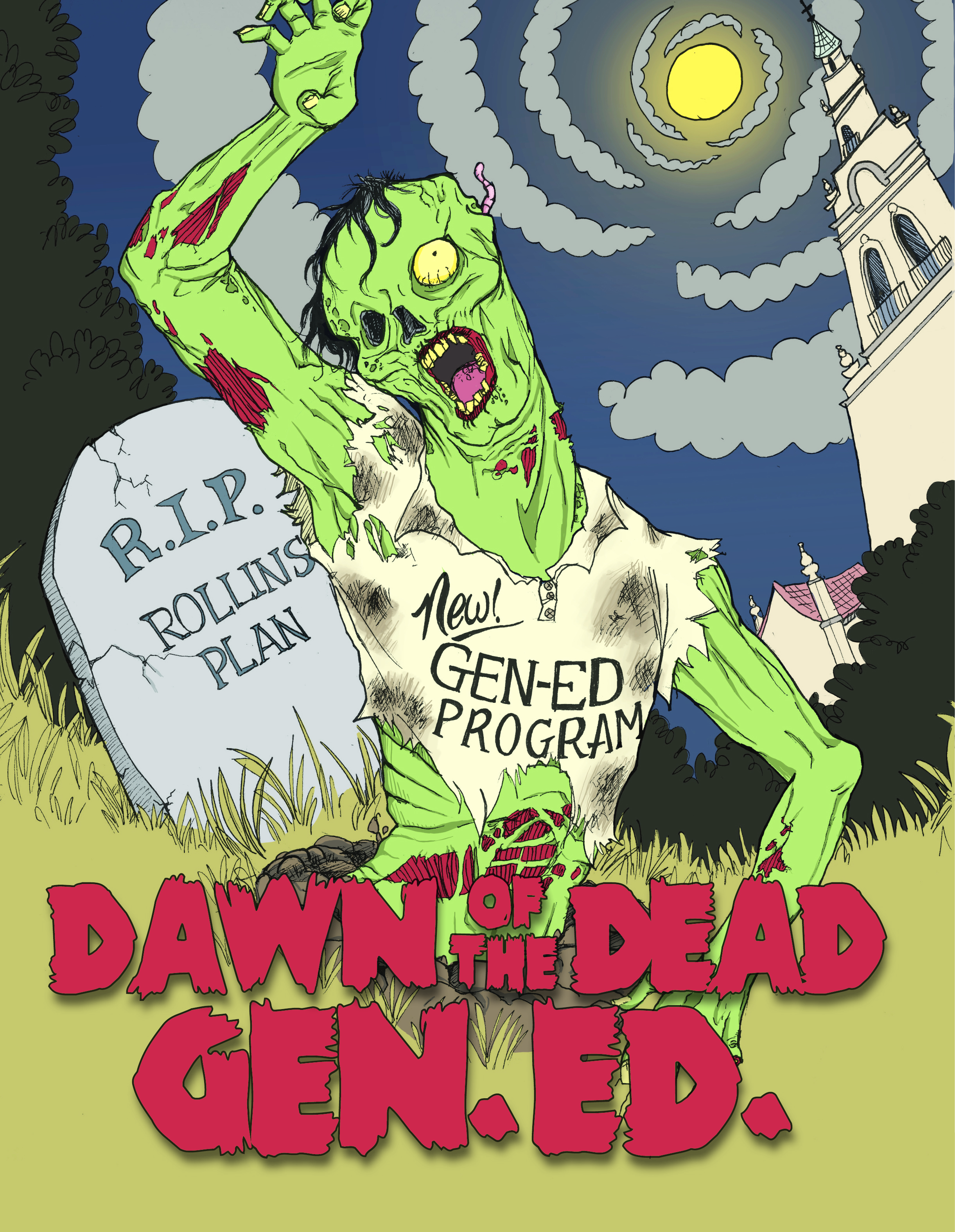 Of the 10 tentative neighborhoods that will, starting next August, comprise Rollins’ new general education curriculum, a personal favorite is “Mysteries: Into the Unknown.” In the neighborhoods’ official description, however, many examples of mysteries are listed — among them, “Mona Lisa’s smile, antimatter, the Shroud of Turin, an ideal democracy [and]…Sherlock Holmes,” — including the conspicuously absent fate of the Rollins Plan.
Of the 10 tentative neighborhoods that will, starting next August, comprise Rollins’ new general education curriculum, a personal favorite is “Mysteries: Into the Unknown.” In the neighborhoods’ official description, however, many examples of mysteries are listed — among them, “Mona Lisa’s smile, antimatter, the Shroud of Turin, an ideal democracy [and]…Sherlock Holmes,” — including the conspicuously absent fate of the Rollins Plan.
Introduced in Fall 2009, the R-Plan was a thematic approach to general education that was markedly different from the more conventional “alphabet soup” model in effect at the time, intended to offer students a more cohesive, interdisciplinary liberal arts experience. Freshmen were aggressively recruited to adopt the program and by the end of the semester, more than 90 had. This made it especially strange when, in a year’s time, the R-Plan had seemingly been forgotten by the Rollins’ administration figures, faculty members and students alike.
By late 2010, what had once been one of the school’s most visible, well-promoted academic programs was scarcely mentioned by anyone, in any context. The R-Plan had vanished without a trace — much like an aircraft over the Bermuda Triangle (which, for the record, is another example of a mystery cited in the official description of “Into the Unknown.”) Although the parallel kind of ends there because, unlike a Triangle-related disappearance, a cursory glance into the Case of the Missing R-Plan reveals just what happened to the program: Within its first year, well over half of its 90 participants dropped the R-Plan in favor of the gen. ed. model they had previously abandoned. An official school document mentions student dissatisfaction with the program’s courses — both in their comparatively small number and in the manner of their instruction — as a chief reason for its eventual demise.
This official school document, by the way, is the formal proposal for Rollins’ new general education curriculum, for which the R-Plan served as pilot program. Which means, despite its resounding failure, the R-Plan will be resurrected come 2013. And on a far larger scale, too: By the time this year’s freshmen graduate, no other plan for general education will exist at Rollins.
Sherlock Holmes isn’t really a mystery, come to think of it — he’s more someone who solves them. Zombies, though: Zombies are definitely a mystery.
…
As the primary architect of Rollins’ new general education curriculum, Dr. Mark Anderson recognizes its pilot program wasn’t a rousing success. “In some sense,” he concedes, “the program didn’t go that well. But we have tweaked it.” Cardinal among these tweaks seems to be the program’s radical expansion—from a two-neighborhood program as was the R-Plan, to a ten-neighborhood program starting next year. And, while this change may address some of the scheduling weaknesses that made the program so unpopular among students, a greater reason appears to exist for the expansion: It was going to happen anyway.
The new program is over six years in the making, and from its inception, the plan had always been to introduce a small pilot program which would then be followed by a wider implementation. This tweak — made because, according to Anderson, “The key weakness in the [pilot] program was scheduling: There were not many options for courses,” — is a tweak of extreme convenience: An improvement not made because of the R-Plan’s weaknesses, but because it’s a necessity. The expectation seems to be that a failure’s fivefold multiplication will also be its reversal. For a curriculum to which the better part of a decade has been dedicated, this kind of thinking is distressingly callow.
Or, it’s the opposite: The better part of a decade has, after all, already been dedicated to this thing. It’s a failure with some serious momentum. To admit a serious miscalculation has been made would, on Rollins’ part, constitute a public relations nightmare. It would also constitute a tremendous waste of money. According to Anderson, the transition to the new curriculum “will only cost a couple hundred thousand dollars.” If forced to spend another couple hundred thousand dollars retooling and re-implementing Rollins’ approach to general education, I have a feeling he’d have a lot more trouble describing the sum as “only” anything. So what’s the next best thing to do?
Play the failure as a wild success, maybe.
…
Upon its introduction three years ago, the R-Plan was heralded as innovative — as a modern approach to the liberal arts for a modern liberal arts school, a means to prepare Rollins students to be members of a nascent, global citizenry. These are words that sound really nice, and look even better — especially when lavishly printed in glossy brochures, as they surely will be in the weeks and months to come. Better, these are words that are just vague enough to resist qualitative proof or disproof: If Rollins says these things are true of its new curriculum, there’s not much to do but take the school at its word. There’s no way to know for sure. It’s a mystery.







Be First to Comment